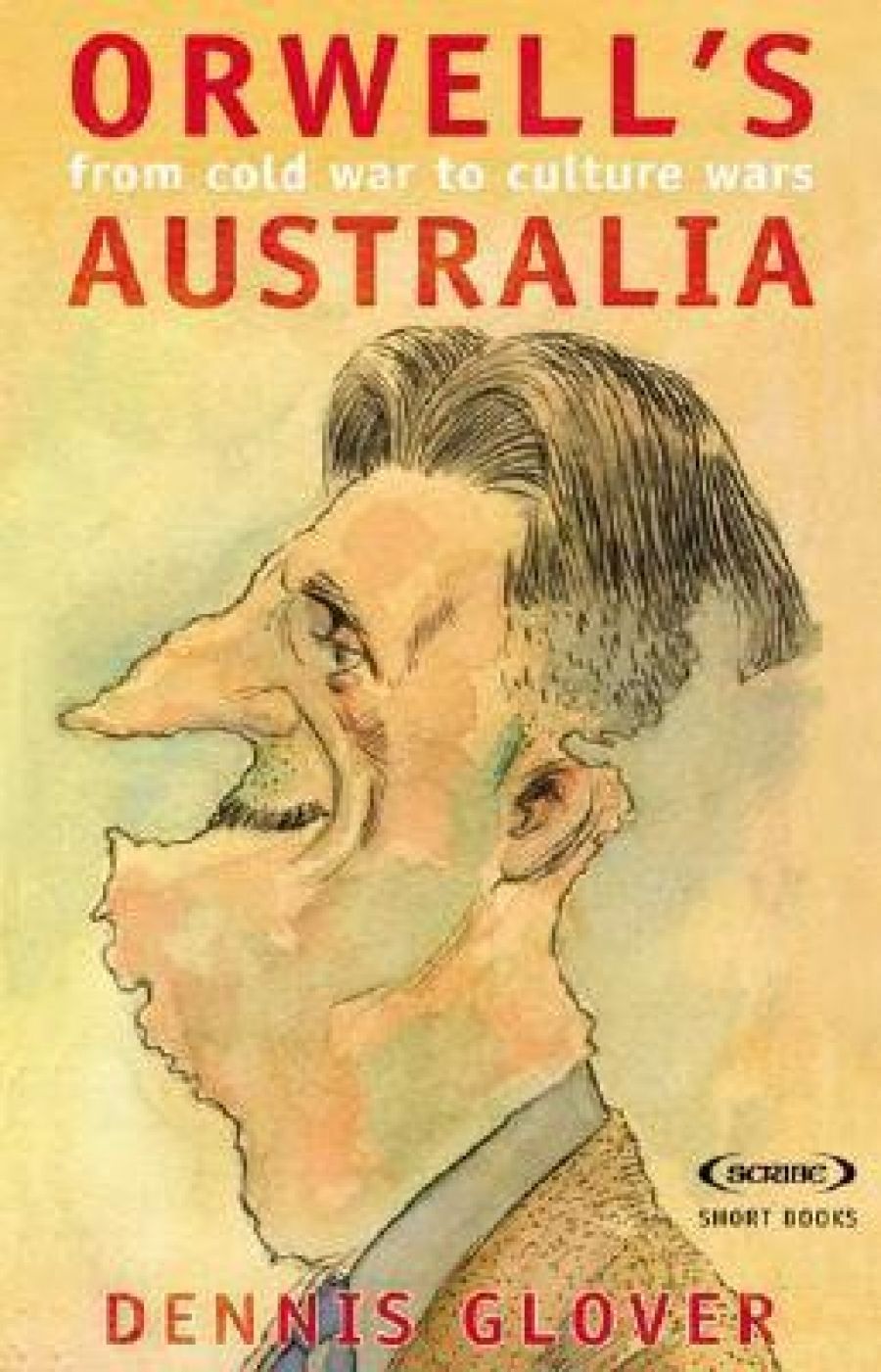
- Free Article: No
- Contents Category: Politics
- Custom Article Title: Orwell's Legacies
- Review Article: Yes
- Article Title: Orwell's Legacies
- Online Only: No
- Custom Highlight Text:
George Orwell must be spinning in his grave. Aghast at the use of his name to inspire any political crusade or bandwagon, the ardent advocate against the use of language to spin an alternative reality is forever being used to bolster the armory of political activists around the world.
Should Orwell be allowed to rest? Simon Crean’s speechwriter, the cerebral Dennis Glover, evidently thinks not. One hundred years after Orwell’s birth, Glover has recruited the socialist contrarian, novelist and essayist to his cause. In Orwell’s Australia: From Cold War to Culture Wars, Glover invokes Orwell’s legacy to rail not against the decline of the English language and the use of words to say one thing while meaning another, as is often the case, but rather to lament the state of modern Australia and the lost dream of a ‘social democracy without ideology’. Just like Orwell in the first half of the twentieth century, Glover sees a bleak future characterised by ‘the disappearance, under the pressure of coming wars, of a whole way of life, and its replacement with something shallower, nastier, prefabricated, more ideological and more politically and socially divided’ – in other words, John Howard and conservative hegemony enveloping the Australian way of life.
- Book 1 Title: Orwell's Australia
- Book 1 Subtitle: From cold war to culture wars
- Book 1 Biblio: Scribe, $19.95 pb, 145 pp
- Book 1 Cover Small (400 x 600):

- Book 1 Cover (800 x 1200):

Glover wants to retrieve Orwell from the conservatives who, he argues, have used the socialist writer and agitator to legitimise their attempts to ‘weaken the institutional foundations of the reforming parties, and remould Australia’s institutions and working-class loyalties to help build a long-term conservative political majority’. He criticises the predominance of ideology, media manipulation and partisanship in politics, and the undermining of ‘the fair go’. Glover says that these neo-conservatives appeal to the Orwell of Animal Farm (1945) and Nineteen Eighty-Four (1949), identifying with the critique of oppressive totalitarianism and the ideological rigidity and moral weakness of Stalinism and communism. However, they neglect the angry working-class champion who wrote The Road to Wigan Pier (1937), and the Orwell of Homage to Catalonia (1938), his memoir of the Spanish Civil War. The conservatives, Glover says, represent only ‘an ossification of Orwell’s ideas, reduced to a cliché’. And this is precisely Glover’s point: he wants to reclaim Orwell for Labor. According to Glover, Howard would most certainly be the villain in a post-apocalyptic, neo-conservative Nineteen Eighty-Four, refreshed and modernised for the new century, and for Australian consumption.
Those on the right are not the only targets in Glover’s sights. The broad left joins the far right in a spray, with scathing critiques of those bloodied by the ‘culture wars’ of present day. Glover criticises the media for their rabid partisanship, and the Australian people for allowing themselves to be ‘deceived’ over the ‘children overboard’ scandal.
The characters may have changed since Orwell’s day, but the debates remain the same. The Cold War has been replaced by a ‘culture war’, with the new left pitted against the new right in a battle for the nation’s soul. He bemoans the fractured decline of the centre-left, hoping to inspire a new coalition of progressives to combat conservative politicians and their like-minded columnists and political supporters. He urges those on the left to get ‘inside the whale’, as Orwell did when writing from a working-class perspective; to see ‘what life is really like, not about what our ideologies tell us it should be’. Unless the left can truly empathise with the present needs and future aspirations of the working class, its political ambitions will remain unrealised.
Clearly unencumbered by the back-room anonymity of the political adviser, Glover outlines his own views on a range of topics from refugees and the Tampa to Aboriginal reconciliation, the ‘stolen generations’, the war in Iraq and the search for weapons of mass destruction. Dirty hands in politics is his central target. He has accepted Orwell’s warning in Nineteen Eighty-Four that: ‘Who controls the past controls the future: who controls the present controls the past.’
This is not a comprehensive account of Orwell, his life or writings. In reaching back to Orwell, Glover’s task is twofold: he believes that lies and deceit weaken our democratic foundations, and that Labor and the broader centre-left is simply irrelevant if it is unable to relate to ‘ordinary people’ or to fashion a strategy to win office and implement reform. It serves a political, not literary, purpose.
Make no mistake, when talking political strategy, there is no place here for Bill Clinton’s political Svengali, Dick Morris, or his inspiration, Niccolò Machiavelli. Glover’s aim is not to win over his opponent’s supporters, Howard’s aspirational, suburban voters, but rather the disaffected and angry on the broad left, who have abandoned Labor in search of more progressive and radical political solutions. One suspects this focus is too narrow. Whilst Orwell’s appeal is a noble one, a touch of Morris and Machiavelli is needed to fight a wily political veteran such as Howard.
In recent years, Orwell’s legacy has been examined and re-examined, with many trying to unravel his words and deeds to discover the true meaning. The left and right have invoked and condemned Orwell, who expressed progressive and conservative views, opinions that were shaped over time, as a result of experience, instinct, observation and thought.
Christopher Hitchens, in Orwell’s Victory (2002) – perhaps the most insightful analysis of Orwell in recent years – has summed up what may be Orwell’s true legacy: ‘it matters not what you think, but how you think.’ In that spirit, Glover’s appeal to the left to understand Howard’s Australia is timely and perceptive.


Comments powered by CComment